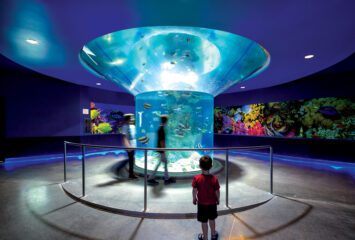8 Great Benefits of Project-Based Learning
Certain aspects of a strong, well-rounded education will never change. For instance, strong communication and partnership between teachers and parents will always play a central role in student success. Best practices of instruction continue to evolve as educators learn more about cognition, student motivation, and the skills 21st century learners need to succeed. Project-Based Learning (PBL) is a student-centered pedagogy that is becoming an important part of the curriculum at Pardes Jewish Day School.
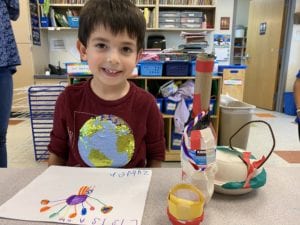
What Exactly is Project-Based Learning?
One way to understand PBL is to compare it with the more traditional education model that most of us experienced in school. You probably remember being given instruction, assigned an independent reading or activity, and later being tested to demonstrate what you retained. While that remains one approach to learning, PBL provides opportunities for increased student engagement and depth of understanding.
With PBL, students work on projects for an extended period of time. It might be a week, two weeks, or something they stick with over an entire semester. These projects are often collaborative efforts, and they give students a voice and choice to customize aspects of the project according to their interests. With PBL, the project is the vehicle for learning; teaching, learning, research, formative assessment, feedback, and revision all take place during the project, not at the end.
What does that look like in the classroom? Laurie Burckhardt, one of our middle school science teachers, describes a recent PBL exercise with her class.
Sixth-grade students investigated different ways of answering the question: How can I reduce my carbon footprint and create change in my world? Students took part in a sustained inquiry and then designed a personal challenge to reduce their negative impact on the environment. Their public product, an animated video, explained their goal and followed their progress. It included a call to action for others to consider undertaking the same challenge to enact positive change for our planet.
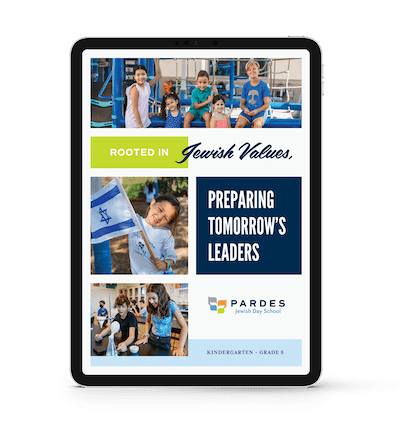
Learn more about Pardes
Benefits of the Project-Based Learning Approach
While there are many reasons to incorporate project-based learning activities into a school curriculum, there are eight core benefits that can help parents understand the value of PBL for your child.
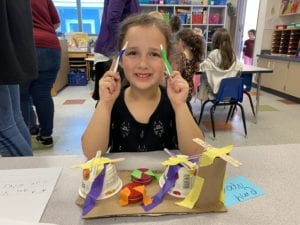
Critical Thinking
Almost every school recognizes the need for teaching this fundamental skill, but project-based learning opens up unique learning opportunities for critical thinking. Through PBL, students:
- Meet experts and learn from others in the field
- Learn to carefully consider options as their projects move forward
- Develop their skills for receiving feedback and using reflection
Meaningful Collaboration
As students discover ways to work within a group, it instills so many of the interpersonal values and skills they (and our future communities) need. Students learn to value the work and contributions of others, share responsibilities, and compromise. Critiques and revision are major components of gold-standard PBL, so feedback from peers and teachers is an integral part of our projects.
Deeper Engagement
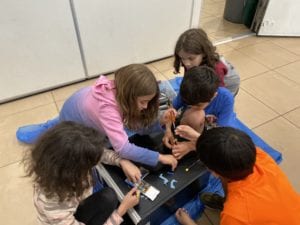
This is one of the most beautiful byproducts of this approach. Students learn more because they want to learn more. They become the driving force for their own learning as they discover their voice matters and their learning has relevance and purpose.
Communication Development
A presentation to the class or group at the end of a project-based learning exercise is just one of the ways that students are offered the opportunity to practice and grow in their writing, public speaking, and effective communication. They also continually hone these skills at the micro and interpersonal levels throughout their projects.
Fosters Creativity
The difference in creative ideation and design is remarkable with project-based learning. In this approach, student agency is huge. We provide support and scaffolding, but students take charge of the project. The choices of what to use and how to present materials are left to the students.
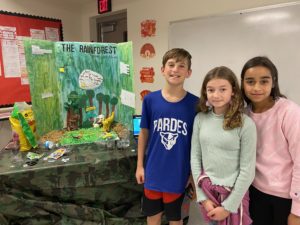
Cross-Discipline by Design
Project-based learning combines ideas and skills from different disciplines. Content is not taught in isolation; students engage in robust experiences that help them explore how a variety of disciplines work together, similar to how “learning” happens in the real world. For example, the fourth grade Entrepreneurship PBL incorporates language arts, math, and social studies as students work to design and advertise their own business ventures.
Perseverance
Project-based learning is an opportunity for students to critique and revise their approach when they encounter obstacles. As they continue to actively explore a real-world problem, they acquire a deeper knowledge that requires further inquiry — they have to keep going.
It’s Fun!
No one said a curriculum or learning needs to be boring, but that’s what many traditional models can be for students. Project-based learning creates a personal connection between the students and the material that makes the learning process purposeful, relevant, and significantly more meaningful!
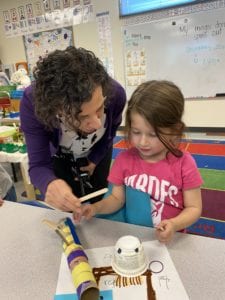
Project Based-Learning in Action at Pardes
PBL at Pardes centers around encouraging students to be agents of change. We provide opportunities for students to engage in inquiry-based learning that involves real-world problems that are both age and developmentally appropriate. Our goal is to create citizens of the world who are empowered to make a difference.
For example, our youngest students in kindergarten were asked to consider topics such as:
- How do we keep our community safe on the playground?
- How do we care for a class pet? What does that responsibility entail?
And our seventh-graders are deeply engaged in questions about how their personal choices affect their immediate community. There are opportunities for meaningful engagement at every grade level for Pardes students.
Experience the Benefits of Project-Based Learning Firsthand
One of the best ways to understand the benefits of PBL is to learn about it firsthand. Schedule a virtual meeting and tour to see how PBL can positively impact your child’s development and love of learning.




